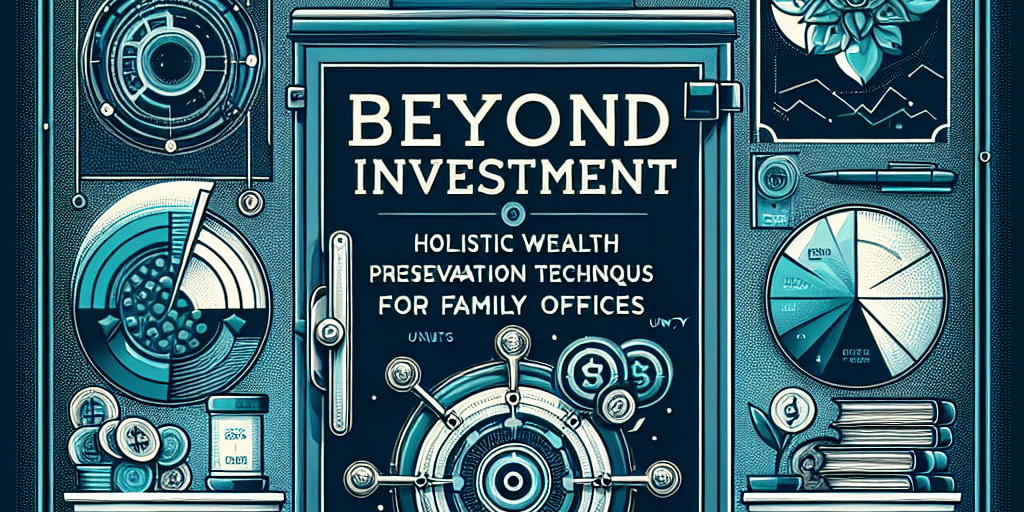Family offices have emerged as essential guardians of wealth, providing tailored financial solutions and strategic planning to high-net-worth families. While investment strategies are often at the forefront of wealth management discussions, the preservation of wealth extends far beyond mere financial returns. In a rapidly changing economic landscape fraught with uncertainties, family offices must adopt a holistic approach to wealth preservation that incorporates financial, social, emotional, and intellectual dimensions. Here, we explore innovative techniques to achieve this comprehensive wealth preservation.
Understanding Holistic Wealth Preservation
Holistic wealth preservation recognizes that wealth is not just about financial assets; it encompasses family values, legacy, well-being, and interpersonal relationships. Effective family offices intertwine financial strategies with the family’s broader goals and aspirations, fostering a legacy that can be passed down through generations.
1. Diversifying Investments Strategically
While diversification is a commonly employed strategy for minimizing investment risk, a family office should approach it with a holistic lens. This involves not only investing across asset classes—such as equities, fixed income, real estate, and alternative investments—but also exploring geographic and sector-related diversification.
Moreover, integrating impact and ESG (Environmental, Social, and Governance) investing can empower families to align their portfolios with their values, cultivating a sense of purpose in their wealth management strategy. By exploring sustainable investments that resonate with the family’s mission, they create a legacy that reflects their principles and values.
2. Building an Intergenerational Succession Plan
One of the most critical aspects of wealth preservation is developing a clear succession plan that ensures a smooth transition of wealth and responsibilities to the next generation. Family offices should engage family members in meaningful discussions about their roles in managing wealth and expectations for preserving it.
Creating family governance structures—such as family councils or meetings—can facilitate conversations about financial literacy and development. Equipping younger generations with the necessary skills to manage and grow the family’s wealth fosters responsibility and keeps the family united over time.
3. Risk Management with a Broader Perspective
Wealth preservation is intrinsically tied to effective risk management. Beyond market risks, family offices must consider various factors such as legal, regulatory, reputational, and family-related risks. By conducting comprehensive risk assessments that extend beyond financial markets, family offices can develop strategies that protect the family’s wealth from a wider array of threats.
Engaging with attorneys, tax advisors, and insurance brokers can help identify potential liabilities and implement proactive measures to mitigate them. Additionally, implementing robust cybersecurity measures is paramount in today’s digital age, given the rising threat of cyberattacks targeting wealthy families.
4. Focus on Human Capital
Understanding that people are a key asset, family offices should prioritize the personal and professional development of family members. Providing access to coaching, mentorship, and educational opportunities helps family members develop essential skills and emotional intelligence, enhancing their capacity to manage wealth responsibly.
Moreover, fostering a culture of philanthropy can enhance family bonding while making a positive impact on society. Engaging the family in charitable activities can lead to a shared sense of purpose and fulfillment that transcends financial wealth.
5. Estate Planning and Philanthropy
Beyond investment vehicles, effective estate planning is crucial to ensuring the seamless transition of wealth. Establishing trusts, wills, and other estate planning tools minimizes tax liabilities and dictates how assets will be distributed and managed.
Incorporating philanthropy into estate planning not only provides tax advantages but also reinforces family values and legacy. Families can create family foundations or donor-advised funds to support causes aligned with their beliefs, instilling a sense of responsibility and stewardship among family members.
6. Engaging External Expertise
Family offices should not hesitate to seek external expertise to navigate complex financial landscapes. Collaborating with consultants, financial advisors, and investment managers can provide valuable insights that enhance decision-making. These experts can also help in developing specialized strategies tailored to the unique needs of the family.
7. Mental and Emotional Well-being
The psychological aspect of wealth is often overlooked but plays a significant role in wealth preservation. Family offices should consider integrating mental health and wellness programs into their frameworks, recognizing that emotional well-being is essential for effective decision-making.
Fostering open communication about finance and feelings can alleviate stress and anxiety around wealth, leading to healthier relationships among family members.
Conclusion
Holistic wealth preservation for family offices transcends traditional investment strategies, recognizing that wealth is multidimensional. By integrating financial, social, and emotional frameworks, family offices can craft sustainable and resilient processes that ensure the durability of wealth across generations.
In a world characterized by uncertainty, embracing a holistic approach will empower families not only to preserve their wealth but also to strengthen their bonds, legacy, and purpose, creating a lasting impact that goes far beyond mere financial considerations. Through thoughtful planning and strategic execution, family offices can fulfill their mission as custodians of family wealth, inspiring future generations to navigate their own paths to prosperity and purpose.











